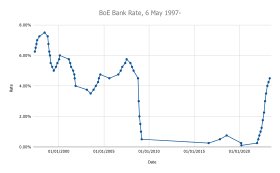
Back Comité de Política Monetaria (Reino Unido) Spanish Komite Kebijakan Moneter (Britania Raya) ID 金融政策委員会 Japanese 금융정책위원회 Korean Jawatankuasa Dasar Kewangan (United Kingdom) Malay Комитет по денежной политике Банка Англии Russian
 Interest rates since the Committee's inception | |
| Formation | May 1997 |
|---|---|
| Purpose | Determining monetary policy |
Chairman | Andrew Bailey (ex officio) |
Parent organization | Bank of England |
Staff | 9 |
| Website | Monetary Policy Committee |
The Monetary Policy Committee (MPC) is a committee of the Bank of England, which meets for three and a half days, eight times a year, to decide the official interest rate in the United Kingdom (the Bank of England Base Rate).
It is also responsible for directing other aspects of the government's monetary policy framework, such as quantitative easing and forward guidance. The Committee comprises nine members, including the Governor of the Bank of England, and is responsible primarily for keeping the Consumer Price Index (CPI) measure of inflation close to a target set by the government, currently 2% per year (as of 2019).[1] Its secondary aim – to support growth and employment – was reinforced in March 2013.
Announced on 6 May 1997, only five days after that year's General Election, and officially given operational responsibility for setting interest rates in the Bank of England Act 1998, the committee was designed to be independent of political interference and thus to add credibility to interest rate decisions. Each member has one vote, for which they are held to account: full minutes of each meeting are published alongside the committee's monetary policy decisions, and members are regularly called before the Treasury Select Committee, as well as speaking to wider audiences at events during the year.
- ^ Bank of England, Inflation and the 2% Target, website updated 10 May 2019. Retrieved 27 December 2019